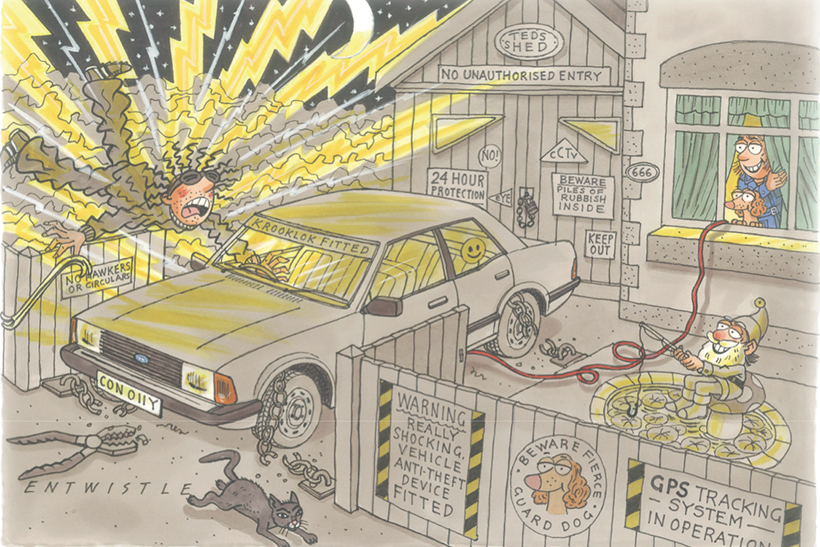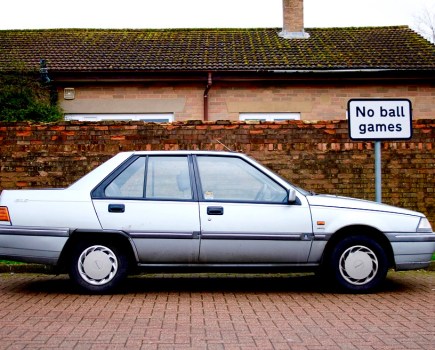Ted Connolly talks classic car theft…
Two characteristics that I particularly loathe in the human race are greed and dishonesty. By greed, I mean the selfish craving to have more and more, be it food, money, houses, cars – in fact, anything. Dishonesty requires no qualification. It speaks for itself. Maybe if I’d possessed both of these traits then I would have lots of money and many more friends than I have, But that isn’t the case (and I’m not saying this to make me look like a good bloke, just telling it the way it is – and, yes, I’ve got plenty of other faults).
So, having said that, you can easily imagine my opinion of car thieves. I hate them with a vengeance that mere words from the Oxford English Dictionary cannot explain. They cause disruption and financial loss and, in the case of classics, a lot of heartache. Almost every enthusiast gets emotionally attached to their car, it’s part of the scene, and losing your classic is almost like a bereavement.
A little while back, the lowlife picked on classics not because of their intrinsic value, but because they are easy to steal and at a time when scrap metal values were high, it was a simple way to make a few hundred quid for an hour or so’s work. Scrap prices have dropped and, as a result, so have the thefts of old cars, but only to an extent.
The thing is that the scum section of society are, actually, quite knowledgeable and they know what fetches good money and is easy to dispose of. Good examples are the fast Fords from the late-’70s and early-’80s. Anything with sporting pretensions and, perhaps, an RS badge is prized.
Well, OK, I’m probably telling you something you are already well aware of. The thing is, what can you do about it? There are plenty of anti-theft products on the market and they are aimed at making cars either difficult to steal or problematical to dispose of. Sophisticated immobilisers can be fitted that interrupt the ignition and (depending on what’s fitted) the fuel system. You can also fit an alarm, although it appears that nobody takes much notice if a siren or hooter goes off. Come on, what do you do when you hear one? Ignore it, of course.
A highly-effective deterrent is a steering wheel lock. They can be overcome, but they rob a would-be thief of vital minutes. Similarly effective – but in a different way – are kits to mark various components, so that they can be identified with an ultra-violet light if a thief tries to sell them on. They don’t stop your car being stolen, but they make life difficult for the offender.
Trackers are one of the big things and, basically, you hide a device on your car, which allows it to be electronically tracked using a GPS system. Clever, that. But get this – thieves have cottoned on to this one and fit trackers of their own. It can be – and is – done surreptitiously at shows. Their trackers tell them where your car is, they plan their crime and nick it at their convenience.
The stark reality is that if a gang of organised thieves wants to steal your car, they will. End of story. Even it if means pulling it on to the back of a low-loader.
I was in touch with a chap recently who had a collection of old tractors – they’re worth money, these days – and he kept them locked in a barn with steel doors. The crims descended in the middle of the night, used a truck (or something hefty, anyhow) to rip the doors open and haul out one of the tractors. They broke into a nearby shed, found a trailer and actually used it to cart off some valuable mechanical parts lying around. So, what could the owner have done to prevent this happening? Nothing, that’s what.
All you can do is fit an anti-theft device, keep your car locked up and as safe and secure as possible, don’t boast about it or broadcast its whereabouts and make sure your insurance company has an agreed pay-out value. Notice I didn’t say agreed value, because that is something totally different. You need to get in writing what the company will actually pay out the event of loss.
in
Perhaps one of the most effective anti-theft measures I have ever encountered was when I visited someone to do a feature on his car (although, for the life of me, I can’t remember what it was). After the interview, I spotted a large shed and, being the anorak that I am, I just had to know what was inside. He pulled back the doors to reveal piles and piles of rubbish – old oil cans, bits of engine, stacks of newspapers, various jars and bottles, in fact, all manner of stuff – and behind that was a large shape shrouded in old sheets and blankets. He waded through the junk and pulled back the cloths to reveal a 1920s Buick in absolutely stunning condition. Worth a few bob then, worth many more bob now. He explained that a) very few people knew it was there and b) it would take so long to clear the way that no thief in his or her right mind would contemplate stealing it.
I have actually had one car stolen. It was a MkV Cortina and, although regarded by some as a classic now, it was my everyday transport at the time. It was a real drag, because I’d had it fully serviced, fitted new boots and installed a top-notch sound system. Not only that, but I’d arranged a feature and, without transport, had to cancel the trip.
Returning to my original statement that there is nothing you can do to prevent a truly determined thief, I will modify that. Say, just say, you wired up your car to the mains and returned in the morning to discover the frazzled remnants of some sort of creature clinging to the bodywork. Let me just point out that I am only hypothesising and would not condone any such practice. That would be illegal and you already know my moral stance on such matters.






